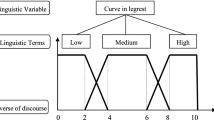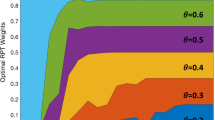Abstract
In this paper, we analyze a matrix game using a rough programming approach. The combination of a matrix game and a rough programming approach represents a new class defined as a rough matrix game. The pay-off elements are characterized by rough variables, and the uncertainties of the rough variables are measured using a measure known as trust. Based on this trust measure, we defined trust equilibrium strategies and a rough expected value. We derived a series of optimal solutions to a rough matrix game using a genetic algorithm. We present a numerical example that illustrates the effectiveness of our rough matrix game.
Similar content being viewed by others
References
Bector CR, Chandra S (2005) Fuzzy mathematical programming and fuzzy matrix games. Springer, Berlin
Campos L (1989) Fuzzy linear programming models to solve fuzzy matrix game. Fuzzy Sets Syst 32:275–289
Das CB, Roy SK (2010) Fuzzy based GA for entropy bimatrix game. Int J Uncertain Fuzziness Knowl Based Syst 18(6):779–799
Gao J (2007) Credibilistic game with fuzzy information. J Uncertain Syst 1:74–80
Herbert JP, Yao J (2011) Game-theoretic rough sets. Fundam Inf 108(3–4):267–286
Liu B (2002) Theory and practice of uncertain programming. Physica-Verlag, Heidelberg
Li DF, Nan JX, Zhang MJ (2012) Interval programming models for matrix games with interval payoffs. Optim Methods Softw 27(1):1–16
Nishizaki I, Sakawa M (2001) Fuzzy and multiobjective games for conflict resolution. Physica-Verlag, Heidelberg
Pawlak Z (1991) Rough sets: theoretical aspects of reasoning about data. Kluwer Academic Publishers, Dordrecht
Roy SK (2010) Game theory under MCDM and fuzzy set theory. VDM (Verlag Dr. Muller), Germany
Roy SK, Mula P, Mondal SN (2011) A new solution concept in credibilistic game. CIIT Int J Fuzzy Syst 3(3):115–120
Roy SK, Mula P (2013) Bifuzzy matrix game. CIIT Int J Fuzzy Syst 5(1):10–18
Roy SK, Mula P (2015) Rough set approach to bimatrix game. Int J Oper Res 23(2):229–244
Zeleny M (1975) Games with multiple payoffs. Int J Game Theory 4:179–191
Zhao J (1990) The equilibria of a multiple objective game. Int J Game Theory 20:171–182
Acknowledgments
The authors would like to thank the editor and the anonymous referees for their helpful comments for revising the article.
Author information
Authors and Affiliations
Corresponding author
Rights and permissions
About this article
Cite this article
Roy, S.K., Mula, P. Solving matrix game with rough payoffs using genetic algorithm. Oper Res Int J 16, 117–130 (2016). https://doi.org/10.1007/s12351-015-0189-6
Received:
Revised:
Accepted:
Published:
Issue Date:
DOI: https://doi.org/10.1007/s12351-015-0189-6




